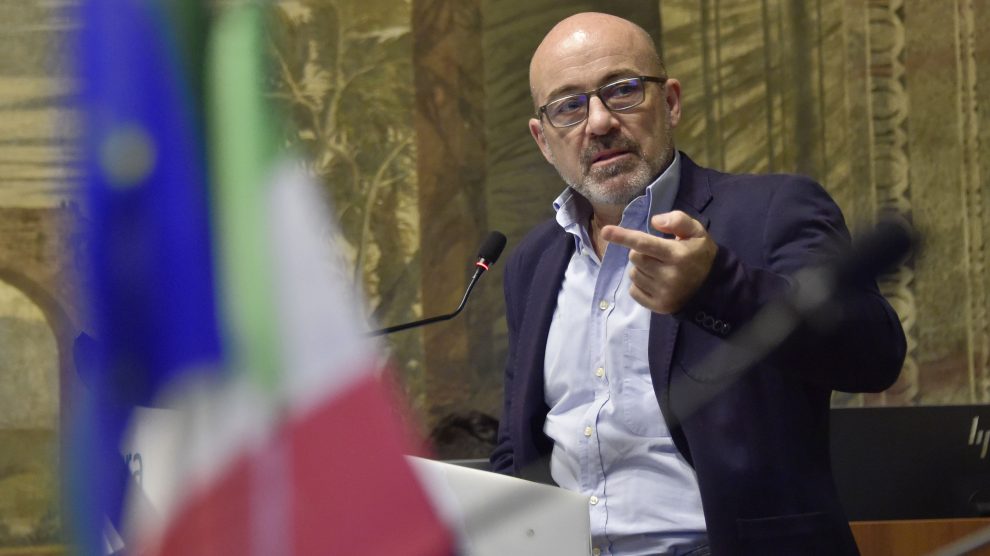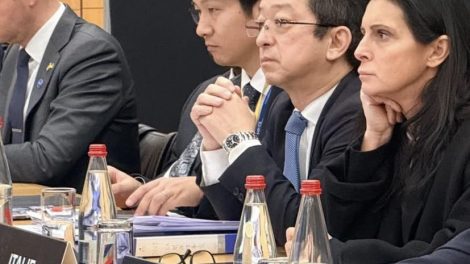In 1987, a year after the Chernobyl disaster, the Italians rejected nuclear power by means of an emotionally-charged referendum. Today, however, the tide seems to be slowly turning; nuclear-generated electricity is increasingly being seen as a necessary means to ferry the country towards decarbonisation while ensuring continued, sustainable and cheap energy production.
The growing science-based consensus on nuclear as a safe and sustainable energy source (which is also shared by a report from the EU’s Joint Research Centre) has found its footing in Rome’s upper echelons of power. On Wednesday Roberto Cingolani, currently serving as Italy’s first Ecological Transition Minister, argued it would be “crazy” to ignore that technology.
A physicist, an academic and formerly the scientific director at the Italian Institute of Technology in Genoa, the “technician” public official – who is not officially affiliated to any political force – was onstage at an event hosted by the small-yet-influential centrist party Italia Viva.
“Fourth generation [nuclear] technologies are emerging, without enriched uranium and heavy water. Some countries are investing in this technology; it’s not mature yet, but it’s close,” he argued. “If at some point it turns out that [the process produces] very few kilos of radioactive waste, it would be crazy not to consider this technology, considering the high safety level and low cost.”
Then Mr Cingolani excoriated nuclear power critics, stating that it’s “forbidden to ideologize any type of technology, in the interest of our children […] The world is full of radical chic environmentalists and extremist, ideological environmentalists: they are worse than the climate catastrophe we are running towards, if we don’t do something sensible. They are part of the problem.”
The minister urged the public to be realistic when it comes to the ecological transition. “If you don’t look at the numbers, you risk hurting yourself like never before.” He underscored the need for a socially sustainable process, warning that “CO2 cannot be reduced by closing car factories starting tomorrow, putting millions of families on the streets.”
Mr Cingolani’s words elicited a wave of reactions. Among those who welcomed them was Libero, an Italian conservative daily that’s typically not welcoming of environmentalist stances, which chose to open the following day’s paper with the minister’s words.
Predictably, there was also pushback from some environmentalists. Angelo Bonelli, spokersperson of Italy’s Green party, stated that “[Mr] Cingolani insults the ecological world and has started a campaign of fear against the ecological transition, to stop modernisation and defend the interests of oil lobbies.”
Nonetheless, the momentum is growing in Italy (and beyond). Back in November Davide Tabarelli, President of Nomisma (an energy company), commented the nomination of longstanding environmentalist John Kerry as US President Joe Biden‘s special climate envoy and his conversion to nuclear power.
“As has been happening for some years within the American environmentalist circles, he too has reconsidered [nuclear’s] role in the path towards decarbonisation,” the expert noted, recalling a speech at the Massachusetts Institute of Technology in which Mr Kerry explained that nuclear power is essential to achieve the Paris objectives (i.e. limiting global warming to 1.5°C above preindustrial levels, a goal which experts believe it’s almost certainly destined to fail with the current pace of decarbonisation).
More recently Corrado Clini, former Environment Minister, invited participants at the G20 Climate conference (which was held at the end of July in Naples) to include an assessment on the prospects of nuclear power. According to the Net Zero 2050 report from the International Energy Agency, nuclear power (particularly in its next-gen iterations) is “fundamental” to ensure the zero-emission backup for renewable sources both in during transition and in the long term, Clini recalled.
The political will and investments being channeled by the European Fit for 55 strategy towards renewables are virtuous. However, many experts believe that the objectives are absolutely impossible without recourse to “bridging” technologies, such as natural gas and nuclear power. Especially because Europe intends to gradually raise the price of “dirty” energy to discourage its use; on Monday the price of a ton of CO2 in the European market rose to a record €61.
The climate is changing. The industrial one, too. All that remains is to see if the political one will eventually change, too, embracing next-gen nuclear tech and evolving past stale and outdated anti-nuclear positions.





